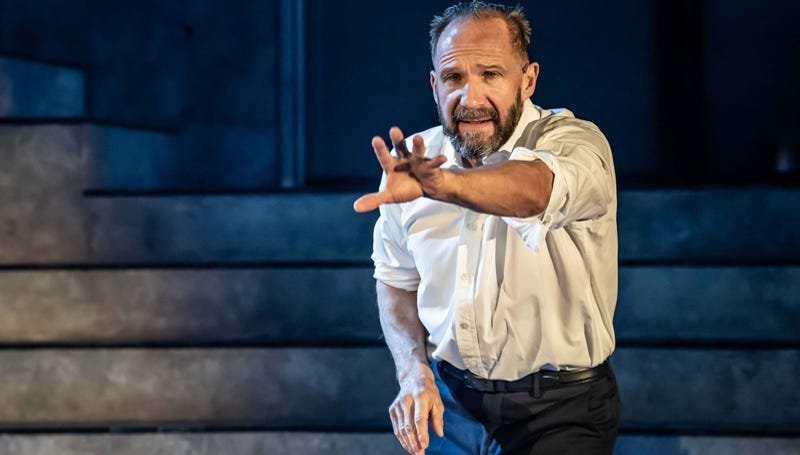Rattle Bag
On a plot hole in Macbeth and much else besides

Catch-up service:
Hitler’s Willing Executioners
How To Fix DEI
On the Gender Divide In Politics
In The Ruffian this weekend: a rattle bag of goodies including management wisdom from Pep Guardiola, an intriguing medical mystery, new evidence on whether YouTube radicalises, some good news for Biden’s prospects, and more.
I went to see Macbeth, starring Ralph Fiennes and Indira Varma, this week, and enjoyed it very much (it’s currently in London, heading to Washington D.C.). It’s a sleek version of one of Shakespeare’s leaner plays, played quite straight without high concept interpretation. Actually there is some conceptual stuff. Fiennes wears modern combat fatigues and the audience walks through rubble and burnt-out cars to get to the stage, in what I suppose is a nod to the war in Ukraine. In the scenes with King Duncan and his entourage, everyone is dressed in the ‘quiet luxury’ style of characters in Succession, which maybe makes a point about elitism. These feel like slightly half-hearted gestures. It’s like the producers have thrown in some stuff for reviewers to sound clever about when all they really want to do is tell the story. Luckily, they do that very well.
With the help of a few judicious cuts (farewell Drunk Porter, you were never as funny as everyone pretended) we get a wham-bam thriller with Fiennes and Indira Varma giving vivid performances, and no weak links among the cast. Fiennes is rather old-fashioned, a real ack-taur who never lets you forget that he’s Acting. He’s at the opposite end of the scale to Andrew Scott’s superb Hamlet a few years ago. Scott played the character so naturalistically you felt he was just, well, being. But Fiennes is excellent nonetheless because he has such presence and authority and conviction. His may not be my preferred mode of acting, but it is his, and he’s really good at it. His Macbeth is ponderous, befuddled, even a little dim, and no match for Lady Macbeth or the three witches.
I’d forgotten how much it’s a play about what we now call toxic masculinity. Shakespeare was clearly fascinated by manhood and violence. Lady Macbeth, of course, is constantly imploring her husband, and indeed herself, to man up and start killing. In the play’s most moving scene, Macduff is told about the murder of his wife and children. Shakespeare doesn’t have him respond with rage, but with stunned disbelief followed by quiet horror (“What, all my pretty chickens and their dam, in one fell swoop?”). Malcolm incites him to, “Dispute it like a man!” - i.e., go and exact violent revenge. Macduff responds, “I shall do so. But I must also feel it as a man.” See - it’s manly to have feelings, as well as to fight. Shakespeare was woke.
Macbeth is also interested in the line between killings that are celebrated and killings that are condemned; between legitimate and illegitimate violence. The play opens with someone describing Macbeth carrying out an act of incredibly gruesome violence on the battlefield, for which he’s acclaimed as a brave hero and given a promotion. Later on, he’s denounced as evil for committing acts which are tame by comparison. The critic Alan Sinfield placed Macbeth in the context of Jacobean state-building, in particular the transition from feudalism to a centralised state. King James, Shakespeare’s patron for Macbeth, looked with envy at the near-absolute power wielded by the Bourbons in France (as did his successor, Charles I, and look how that went). In England, power was more dispersed, as was the capacity for organised violence, with prominent nobles able to raise their own retinues. As Max Weber put it, a modern state must ultimately claim a monopoly on legitimate violence. Shakespeare uses the story of Macbeth to probe this sticky and unresolved question.
The play’s about much else besides, of course. There’s a lot about sleep and how Macbeth can’t get any, which makes me think that Shakespeare - who was writing and acting and running a theatre and going back and forth from London to Stratford and buying real estate and overseeing his daughter’s marriage - was very, very tired. Perhaps he felt he was going slightly mad and this fed into Macbeth’s derangement. His tiredness might also explain a plot hole in Macbeth, which I noticed for the first time during this show. At least I think it’s a plot hole - perhaps you’ll put me right. Here goes.



